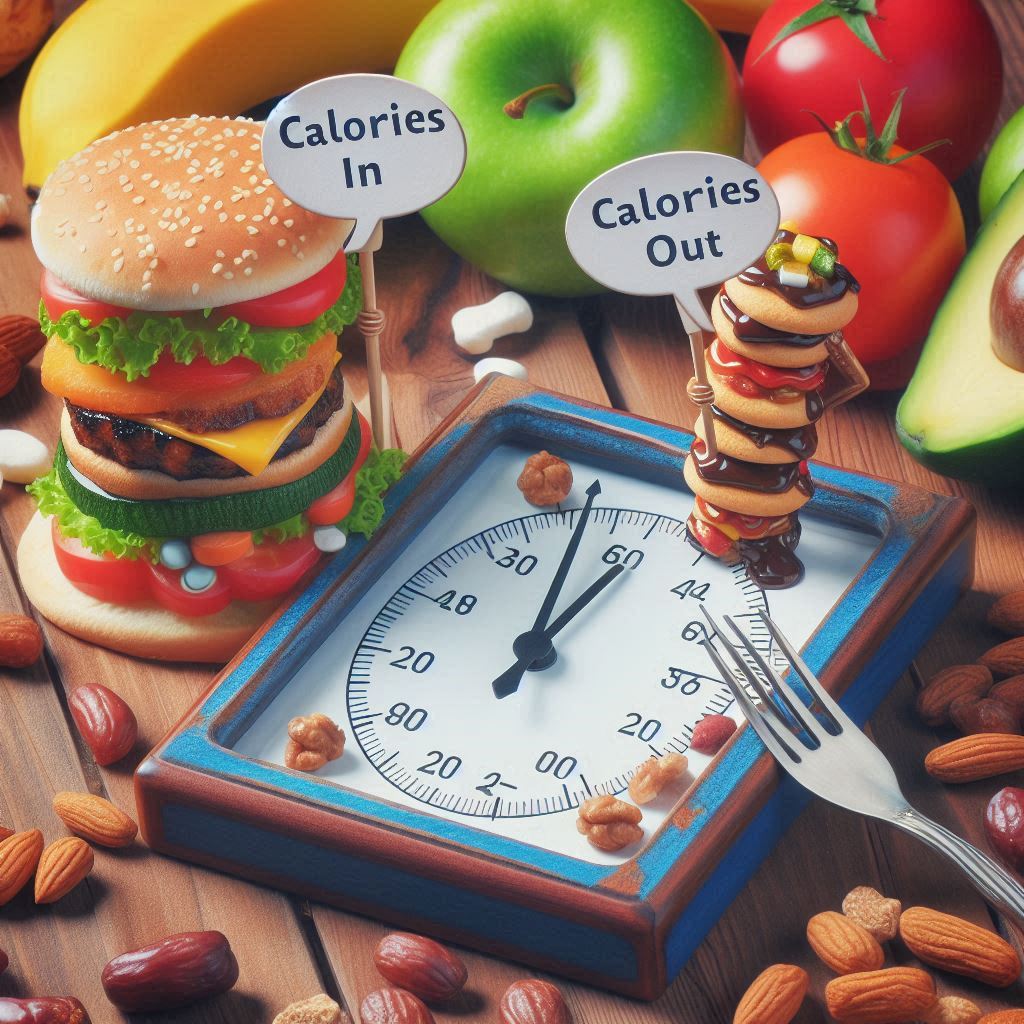Calories In Vs. Calories Out The Key To Weight Loss
Today, I will open up my conversation on a topic many folks find baffling: Weight Management—calories in vs. calories out the key to weight loss. Now, when it comes to shedding pounds or keeping them off, there’s a heap of advice. But it’s not just about cutting out chocolate or hitting the gym extra hard; it’s about understanding the foundations of calorie balance.
I’m here to help you sift through the myths and get down to the science of calories. First, you want to manage your weight effectively. In that case, you’ve got to get familiar with the concept of calorie balance, which involves the calories you take in through food and drink versus the calories you burn through daily activities and exercise.
Knowing your Basal Metabolic Rate, or BMR, is crucial. This is the number of calories your body needs at rest to maintain life – think breathing, circulating blood, and all that good internal stuff. Everyone’s BMR is different and vital because it accounts for a sizable chunk of your daily calories.
But remember, this isn’t just about the number of calories consumed and burned; it’s also about where those calories come from and how they fuel your body. This is the key to weight loss. Now, let’s examine the science behind calories in vs. calories out.

Examining the Science Behind Calories In vs. Calories Out
So, what exactly do we mean by ‘calories in’ and ‘calories out’? Think of it as a simple budget of energy. ‘Calories in’ refers to the energy you put into your body through the food and drink you consume. ‘Calories out’ represents the energy your body expends to keep you alive and fuel all activity, from breathing and walking to exercises.
Next, let’s explore how your body uses calories. Your body needs a certain number of calories to maintain vital functions, known as your resting metabolic rate. Above this, calories fuel every action you take, from typing an email to running a marathon. When you consume more calories than your body burns, the extra calories will always be stored as fat. However, if you burn more calories than you ingest, your body turns to these stored fats for energy, leading to weight loss.
Substantial evidence supports this concept. Multiple scientific studies have illustrated that maintaining a calorie deficit—consuming fewer calories than you expend—leads to weight loss. However, this method is highly individualistic; it may work differently for different people due to metabolic variations, muscle mass, and other factors.
While the ‘calories in vs. calories out’ equation is straightforward, it must provide the complete weight management picture. Our bodies aren’t perfect machines, and how we metabolize food, our hormonal balance, psychological factors, and even the types of food we eat will play a role. But at its core, understanding this is great when starting your weight loss journey.
As we move on, remember that managing your calorie intake and output isn’t about drastic measures or rigid diets. It’s about finding a sustainable balance that works for you so that your weight management strategy becomes a part of your lifestyle rather than a daily struggle.
Strategies for Balancing Calories In with Calories Out
Let’s discuss some practical ways to manage your energy balance effectively. It’s not just about slashing your calorie intake; it’s about making sustainable changes.
- Choose a Diet That Resonates With You: Too restrictive diets are hard to stick to. Instead, focus on eating whole foods that are satisfying and nourishing. If you want to track your intake, use an app or food diary to keep things transparent.
- Ease into Exercise: If you’re new to physical activity, ease into it. Consistency over intensity is powerful. For more experienced individuals, try mixing strength training with cardio; it builds muscle, increasing your resting metabolic rate.
- Incorporate Everyday Activities: Gardening, cleaning, taking the stairs—they all add up. Consider a pedometer or a smartwatch to keep track of your steps and keep an eye on your goals.
- Consistency is Key: Regular check-ins are great for tweaking your plan to suit your needs better. You can always adjust your approach down the road. What’s important is that you’re moving forward.
Balancing your calories in and out sets the stage for a lifelong health journey. Please stick with me; we’re about to explore how to navigate common challenges and maintain healthy habits for good.

Addressing Challenges and Maintaining Healthy Habits
I will be honest—despite your best efforts, you’ll face challenges while managing your calorie intake and outtake. It’s common, and it’s okay. The key is knowing how to navigate these bumps in the road. One of the most common pitfalls in calorie counting is underestimating portion sizes. A simple fix is to use food scales or measuring cups until you get better at eyeballing them.
Now, let’s talk about a game-changer: Mindful Eating. Mindful eating isn’t just about counting every calorie; it’s also about enjoying your food and listening to your body’s hunger cues. Restrictive dieting? It could be more sustainable and fun. Choose a balanced approach that you can maintain over the long haul.
Consider your metabolism, which affects how quickly you use energy. Everyone’s different, and what works for one person may not work for another. Make adjustments based on your own body’s responses.
Finally, the best strategy for keeping weight off is developing habits you can stick with for life. If you love cycling, do that instead of forcing yourself to run. Remember, find healthy food options that satisfy you. Your health journey is uniquely yours. Don’t worry too much about perfection; keep moving forward.
If you need to know your BMR or ideal weight, click here.
FAQ Section: Calories In vs. Calories Out
Understanding the relationship between calories in and out is crucial for weight management. Here are some frequently asked questions to help you navigate this fundamental aspect of health and fitness. Let’s dive into these common queries to clarify your understanding and provide practical advice.
1. Should I count calories or eat healthy?
Answer: Both approaches have merits and can be effective depending on your goals and preferences. Counting calories can provide a precise method for managing your energy intake, which is beneficial for weight loss or maintenance. However, focusing on eating healthy, whole foods can naturally regulate your calorie intake without meticulous tracking, promoting overall well-being and sustainable habits.
Ideally, a combination of both—being mindful of calorie intake while prioritizing nutrient-dense foods—yields the best results.
2. Why am I not losing weight on a calorie deficit?
Answer: Several factors might contribute to this issue. Firstly, you may need to be more accurate in your calorie intake or overestimate your expenditure. Metabolic adaptation can also play a role; as you lose weight, your body’s metabolic rate may decrease, requiring further adjustments to your calorie intake.
Stress, sleep quality, and hormonal imbalances can also impact weight loss. Reassessing your caloric needs, ensuring accurate tracking, and addressing lifestyle factors can help you overcome this plateau.
3. How do I speed up my metabolism?
Answer: To boost your metabolism, consider incorporating these strategies:
- Strength Training: Building muscle increases your RMR, as muscle burns more calories than fat tissues.
- High-Intensity Interval Training (HIIT): This exercise can elevate your metabolism for hours after your workout.
- Stay Active: Move around more and incorporate more movement into your daily routine. Do this daily, such as walking, standing, or taking the stairs.
- Eat Protein-Rich Foods: Protein, like lean Turkey, can temporarily increase your metabolic rate.
- Hydrate: Drinking enough water can temporarily boost metabolism, especially when drinking cold water.
- Get Adequate Sleep: Get more sleep; poor sleep can negatively affect your metabolism and overall energy balance.
4. What turns hunger off in the brain?
Answer: Hunger and satiety are regulated by several hormones and neural mechanisms. Key players include:
- Leptin: Produced by fat cells, leptin signals the brain to reduce appetite when fat stores are sufficient.
- Ghrelin: Known as the “hunger hormone,” this hormone increases appetite and signals hunger to the brain. The levels rise before meals and decrease after eating.
- Peptide YY (PYY): Released in the gut after eating, PYY reduces appetite.
- Cholecystokinin (CCK): This hormone is released during eating and helps promote a feeling of fullness.
- Insulin: This hormone, released in response to eating, helps signal satiety. Practicing mindful eating, consuming high-fiber foods, and ensuring a balanced intake of protein and fats can help manage these hunger signals effectively.
If you enjoyed this post, you might want to check out How Does Calorie Counting Work With Weight Loss?
Let’s embark on this journey to a healthier life together, and cheers to your prosperous future.
Engage with Me!
Ask Questions: If you have any questions about Calories In Vs. Calories: Leave them in the comments below. I’ll gladly help.



